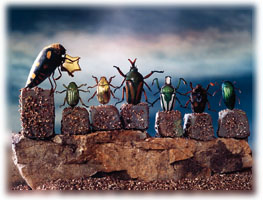Main Menu · Search ·Current Issue ·Contact ·Archives ·Centennial ·Letters to the Editor ·FAQs
Fabulous Bugs Am I Pretty? A coleopterous beauty pageant by Barbara Norfleet |
"Insects have everything I love-- color, beauty, humor, fragility," says Barbara Norfleet, Ph.D. '51. She employs them--beetles, mostly--in her latest book, The Illusion of Orderly Progress (Knopf, $20), to portray in 46 color photographs "man's vanities, arrogance, and foibles."
Norfleet is the founder, director, and curator of the photography collection at Harvard's Carpenter Center for the Visual Arts (see "Shots of 'The Good Life,'" March-April, page 36) and taught photography there for many years. She is a celebrated photographer herself, with pictures in virtually every major museum in America.
As a photographer, she seems to some critics a bit difficult to classify, although she has no such trouble herself: "My black-and-white work is documentary. My color work is metaphoric." Subjects captured in black-and-white range from nuclear reactors to upper-crust members of the country-club set. In color she has shot gruesome toys, dead flowers, animals living in humans' debris, and now these parodic insects.
She bought her bugs from a Texas mail-order purveyor whose catalog looks like a telephone book. "You have to know something about bugs to order," says Norfleet. They came dried. She rehydrated them and arranged their legs and pincers and antennae just so in the fleeting minutes before they dried again and assumed their permanent postures.
The skies in these pictures were shot first. Norfleet propped up with wine bottles a print of a sky on the top of her piano and arranged her subjects in front of it. The trickiest technical challenge was to avoid having the bugs cast shadows on the sky, and to help she tilted the sky forward slightly. Many a time, she says, she spent two days arranging bugs only to have the sky fall down.
In a foreword to the book, biologist E.O. Wilson, Ph.D. '55, Jf '56, Pellegrino University Research Professor and an ant man himself, points out that Norfleet has chosen to comment on human nature through the time-honored device of the animal fable. "Easily recognizable foibles," he writes, "are expressed not with images of our precious and lovable selves, which invite instant familiarity and forgiveness, but with strangers whose behavior can be pitilessly and thus honestly scrutinized. That is human nature: Let others draw contempt for the weaknesses we know dwell in ourselves."